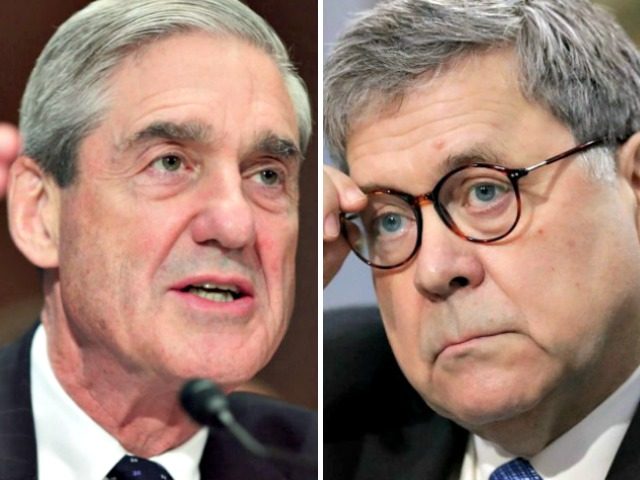Special Counsel Robert Mueller wrote Attorney General William Barr a letter in late March complaining that Barr’s four-page letter to Congress describing the conclusions of the investigation “did not fully capture the context, nature, and substance” of the special counsel’s investigation, the Washington Post reported Tuesday.
Mueller’s March 27 letter “revealed a degree of dissatisfaction with the public discussion of the special counsel’s work that shocked senior Justice Department officials,” the Post reported, citing “people familiar with the discussions.”
Mueller reportedly wrote:
The summary letter the Department sent to Congress and released to the public late in the afternoon of March 24 did not fully capture the context, nature, and substance of this office’s work and conclusions. There is now public confusion about critical aspects of the results of our investigation. This threatens to undermine a central purpose for which the Department appointed the Special Counsel: to assure full public confidence in the outcome of the investigations.
Mueller also reportedly requested that Barr release the report’s introductions and executive summaries, and he made “initial suggested redactions for doing so,” according to Justice Department officials.
News of Mueller’s complaints come on the eve of Barr’s testimony to the Senate Judiciary Committee on Wednesday morning – set to be contentious between Senate Democrats and the Attorney General.
Democrats have accused Barr of trying to secure the most favorable outcome possible for President Trump after the report’s conclusion.
Barr notified members of Congress that Mueller had submitted his report to him on March 22.
On March 24, Barr released a letter to Congress that notified members of Mueller’s “principal conclusions” that the special counsel did not establish any collusion between any member of the Trump campaign and Russia, and did not make a determination on whether the president obstructed justice. Barr subsequently said it was his decision as attorney general to conclude that the president did not obstruct justice.
Barr later argued that his letter was not meant to be a “summary” of the report, and that he wanted the public to know the principal conclusions as quickly as possible after receiving the report before it underwent redactions for release to the public.
The anonymous Justice Department officials told the Post on Tuesday that they were “taken aback by the tone of Mueller’s letter,” and said it was “a surprise to them that he had such concerns.”
Barr has testified that he gave Mueller the opportunity to review his four-page letter, but Mueller declined.
The Post also reported that Barr and Mueller spoke by phone for 15 minutes after Barr released his letter, according to law enforcement officials.
Mueller reportedly said he was concerned that news coverage of the obstruction investigation was misguided and creating public misunderstandings about the special counsel’s work, Justice Department officials told the Post.
However, the Post also reported:
When Barr pressed him whether he thought Barr’s letter was inaccurate, Mueller said he did not, but felt that the media coverage of the letter was misinterpreting the investigation, officials said.
Barr reportedly told Mueller his letter was not a “summary” and that he did not want to put out pieces of the report, but to issue it all at once with redactions.
Mueller’s main worry was that the public was not getting an accurate understanding of the obstruction investigation, the Post reported.
A Justice Department official confirmed that Mueller did send Barr a letter, and that Barr called Mueller to discuss his letter. The DOJ spokeswoman said in a statement:
In a cordial and professional conversation, the Special Counsel emphasized that nothing in the Attorney General’s March 24 letter was inaccurate or misleading. But, he expressed frustration over the lack of context and the resulting media coverage regarding the Special Counsel’s obstruction analysis. They then discussed whether additional context from the report would be helpful and could be quickly released. However, the Attorney General ultimately determined that it would not be productive to release the report in piecemeal fashion.
The Attorney General and the Special Counsel agreed to get the full report out with necessary redactions as expeditiously as possible. The next day, the Attorney General sent a letter to Congress reiterating that his March 24 letter was not intended to be a summary of the report, but instead only stated the Special Counsel’s principal conclusions, and volunteered to testify before both Senate and House Judiciary Committees on May 1 and 2.
Senior Justice Department officials were reportedly frustrated by Mueller’s complaints, because he did not send over the report with proposed redactions the first time they got it. They said his suggested redactions in Mueller’s follow-up letter still did not cover all areas of protected information and the documents needed further review, according to the Post.

COMMENTS
Please let us know if you're having issues with commenting.